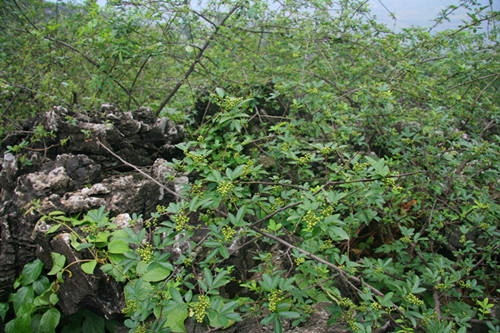Sichuan pepper revives Guizhou's poorest county
- By Zhang Rui
 0 Comment(s)
0 Comment(s) Print
Print E-mail China.org.cn, June 5, 2012
E-mail China.org.cn, June 5, 2012
|
Farmer Wang Fuchang points to his home in Dingtan, Guizhou Province. Once earning about 200 yuan per year, Wang's Sichuan pepper farming business is now highly profitable. [Zhang Rui / China.org.cn] |
Standing in front of the camera, 48 year-old farmer Wang Fuchang described how hard his life once was. "There was an old saying, 'There is water in the river but we cannot drink it; there are women in town but we cannot keep them,'" Wang said. "Girls wouldn't marry us if they knew we were from Dingtan."
"I moved out of the place in 1988," Wang said. "But I moved back because we finally found a way to survive and get rich. It's all due to Sichuan pepper."
Dingtan, one of Guizhou Province's poorest areas, has a harsh past that few people dare to look back on.
More than 8,000 people of 2,700 households lived in the Karst-landformed mountains in four villages of Dingtan District, Zhenfeng County. 90 percent of the area's land is rock. Arable soil only makes up 10 percent of the increasingly-desertified landscape.
Since the soil was thin and lacked water, corn was the only thing the villagers could plant. Everything went from bad to worse. In the 1980s, a farmer's average annual income was less than 200 yuan, while the average annual food amount was just 40 kilograms per person, local government records showed.
"The most important thing people could do at that time was wait for government aid," said Chen Xiangbiao, the vice mayor of the county. He added that 17 households, including Wang Fuchang's, moved out entirely since they couldn't survive the dire conditions.
|
Dingtan villagers have changed their fortunes by planting the Sichuan pepper crop, which flourishes in the rocky soil. [Zhang Rui / China.org.cn] |
Wang even moved his ancestral graves out of the area, which indicated his intention to give up on the land where his family had lived for generations. "I thought I would never come back!" Wang recalled. He went to another village to fix cars for living.
In the early 1990s, at a brainstorming meeting to discuss a way out economic turmoil, farmer Yuan Jialun suggested the village grow Sichuan pepper. "Why don't we plant prickly-ash? It brought me an income of 20 yuan per tree, and you can plant 60 pepper bushes in one mu (0.1647 acre), that means 1,000 yuan income a year. It's better than corn planting," he suggested.
Yuan's words inspired the village and county leaders. After survey and scientific research in 1992, they decided to try zanthoxylum plants, which can be grown on limestone and endure drought conditions. Dingtan's landforms are perfect for growing the plant, and they also help conserve soil and water and maintain the ecological environment, the researchers found.
"But at first, farmers didn't support this. They would say, suspiciously, 'Sichuan pepper is not food." Chen Xiangbiao remembered. "So, several village officials first started to [plant pepper] themselves." The results were good and later, the villagers were convinced that their plan had worked.








Go to Forum >>0 Comment(s)